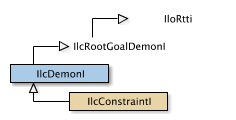
| Overview | Group | Tree | Graph | Index | Concepts |

Instances of IlcDemonI are called demons. Demons
differ from goals in these ways:
IlcDemonI::getConstraintI returns the constraint
associated with a demon.For more information, see the concepts Propagation and Propagation Events.
See Also:
IlcConstraintI, IlcGoalI, ILCCTDEMON0
| Constructor and Destructor Summary | |
|---|---|
public | IlcDemonI(IloSolver solver, IlcConstraintI * ct=0) |
| Method Summary | |
|---|---|
public IlcConstraintI * | getConstraintI() const |
public IloSolver | getSolver() const |
public IloSolverI * | getSolverI() const |
public virtual IlcBool | isAConstraint() const |
public virtual void | propagate() |
| Constructor and Destructor Detail |
|---|
This constructor creates a demon implementation. This constructor should not be called directly because this is an abstract class. This constructor is called automatically in the constructors of its subclasses. The constraint passed as a parameter is the constraint constraint associated with this demon.
| Method Detail |
|---|
This member function returns a pointer to the implementation of the constraint associated with the invoking demon. The demon is known as the parent of the constraint.
This member function returns the solver (a handle) of the invoking demon implementation.
This member function returns a pointer to the implementation object of the solver where the invoking demon was extracted.
This member function returns IlcTrue if the
invoking demon is an instance of IlcConstraintI; it
returns IlcFalse otherwise. In other words, it
lets you know whether the invoking demon is a constraint or a demon.
This member function propagates the invoking demon. Normally, an implementation of this virtual member function will call a member function of the associated constraint.